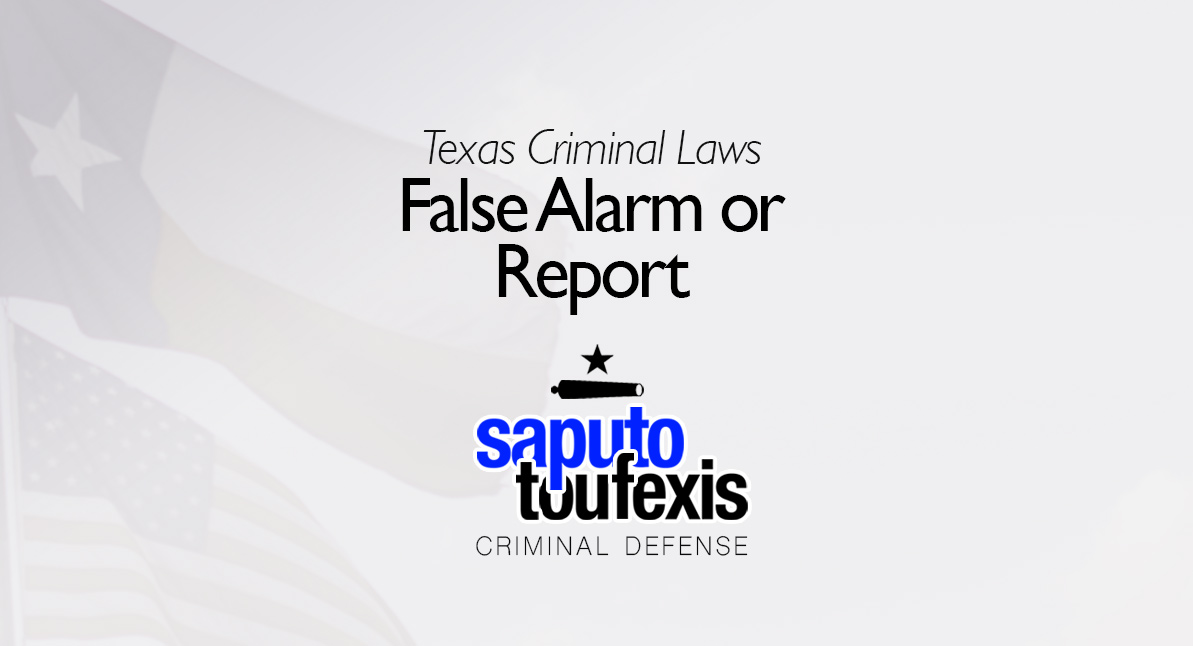The Texas False Alarm or Report law gives police the right to arrest you if they believe you communicated a report about a bombing, fire, offense, or other emergency that you knew was false and that would cause action by an official or volunteer agency organized to deal with emergencies, place a person in fear of imminent serious bodily injury, or prevent or interrupt the occupation of a building, room, place of assembly, place to which the public has access, or aircraft, automobile, or other mode of conveyance.
FAQs about the
False Alarm or Report law in Texas
- What is the current Texas law about False Alarm or Report?
- What is the penalty for a Texas False Alarm or Report offense?
- How can I be charged with a False Alarm or Report offense in Texas?
- What is the statute of limitations for False Alarm or Report in Texas?
- Can you get probation for False Alarm or Report in Texas?
- What level of crime is False Alarm or Report in Texas?
The Texas legislature codified this criminal offense in Texas Penal Code Section 42.06. The legislature did not update this law in 2025. In fact, this law has not been amended since 2013.
The Penal Code classifies the Texas False Alarm or Report law under Title 9 “Offenses Against Public Order and Decency,” Chapter 42 “Disorderly Conduct and Related Offenses.” Learn more about the Texas offense of False Alarm or Report below.
What is the current Texas law about False Alarm or Report?
AV Preeminent Texas lawyer Paul Saputo provides the current law defining False Alarm or Report in Penal Code Section §42.06, as follows:[1]
(a) A person commits an offense if he knowingly initiates, communicates or circulates a report of a present, past, or future bombing, fire, offense, or other emergency that he knows is false or baseless and that would ordinarily:
(1) cause action by an official or volunteer agency organized to deal with emergencies;
(2) place a person in fear of imminent serious bodily injury; or
(3) prevent or interrupt the occupation of a building, room, place of assembly, place to which the public has access, or aircraft, automobile, or other mode of conveyance.
What is the penalty for a Texas False Alarm or Report offense?
A conviction for False Alarm or Report is punished by default as a Class A misdemeanor,[2] with a maximum possible fine under Texas state law of up to $4,000 and jail time of up to one year.
However, a conviction for False Alarm or Report in Texas is punished as a state jail felony if “[t]he false report is of an emergency involving a public or private institution of higher education or involving a public primary or secondary school, public communications, public transportation, public water, gas, or power supply or other public service.”[3]
How can I be charged with a False Alarm or Report offense in Texas?
You can be charged with False Alarm or Report in Texas if the state’s attorneys believe that each of the elements of §42.06(b) as described in the section above have been met.
What is the statute of limitations for False Alarm or Report in Texas?
Misdemeanor level False Alarm or Report charges have a two-year limitations period.[4] Felony level offenses follow the default felony limitations period rule, which specifies a three-year limitations period.[5]
Can you get probation for False Alarm or Report in Texas?
The Texas Code of Criminal Procedure allows both judges and juries to grant probation for False Alarm or Report, and judges are also allowed to accept deferred adjudication plea deals.[6]
Note, however, that no matter the offense, neither judges nor juries may recommend community supervision for any suspended sentence of over 10 years.[7] Also, judges may not grant community supervision after a conviction if (1) the defendant used or exhibited a deadly weapon during the commission of the felony or immediate flight thereafter and (2) the defendant used or exhibited the deadly weapon himself or was a party to the offense and knew that a deadly weapon would be used or exhibited.[8]
What level of crime is False Alarm or Report in Texas?
The Penal Code classifies False Alarm or Report as either a Class A misdemeanor or state jail felony, depending on the circumstances.
Learn more about the penalty range for this offense in the section above.
Legal References:
^1. Texas Penal Code §42.06. This law is current as of 2025.^2. Texas Penal Code §42.06(b)^3. Texas Penal Code §42.06(b)^4. Code of Criminal Procedure 12.02(a)^5. See Code of Criminal Procedure 12.01(11)^6. See Chapter 42A, Texas Code of Criminal Procedure, Art. 42A.054, Art. 42A.056, Art. 42A.102^7. Art. 42A.053(c), Texas Code of Criminal Procedure^8. Art. 42A.054(b), Texas Code of Criminal Procedure










